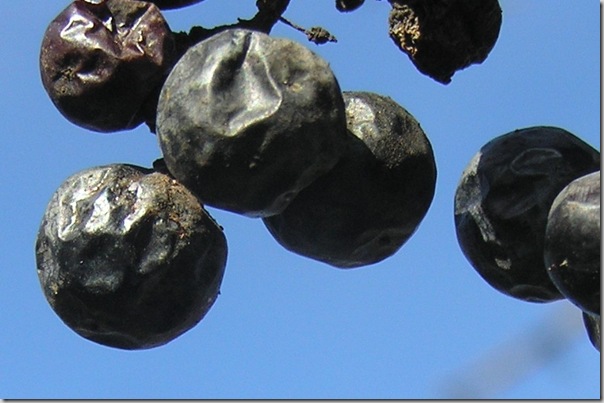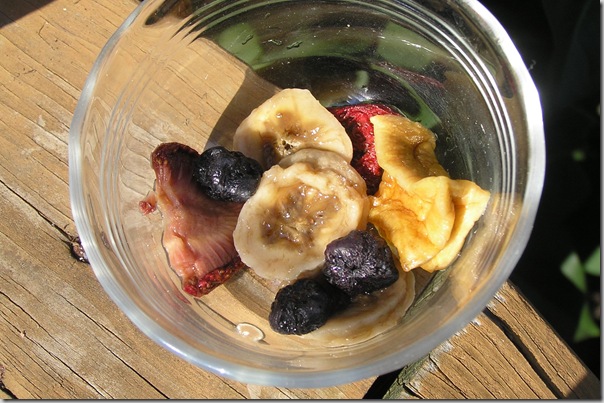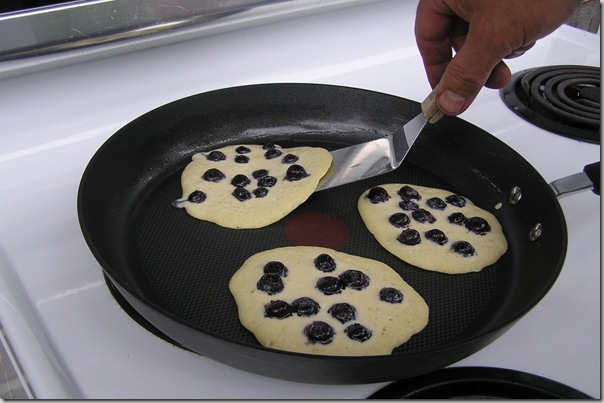***Giveaway below! Comment to win your own copy of Yes, You Can!*** EDIT: Nicole won! Congrats, Nicole.
Daniel Gasteiger charmed me recently when I asked him to tell me about his new book, Yes, You Can! And Freeze and Dry It, Too: The Modern Step-By-Step Guide to Preserving Food.
Daniel said:
The most mind-bending moment I had with the book was the day I fished a cucumber out of a fermentation tank – about 6 weeks after dropping it in – and bit into it. It was so amazingly pickle-y; exactly as it should have been. But there’s something about fermenting vegetables that makes you expect them to taste… spoiled.
Finally! A food-preserving expert who gets it. That is TOTALLY what is stopping me from fermenting, canning, and pickling – I have this irrational fear that I’m going to do something horribly wrong and it’s going to be gross.
He went on:
The idea of the book is that you’re thinking it might be a good idea to preserve your own produce but you’ve never tried. So, I give you a lot of good reasons to preserve your own, explain the many methods available, and we get together in my kitchen to try them step-by-step. I also suggest ways you might use the foods we preserve together and share some of my favorite “recipes.”
Daniel was kind enough to provide a few excerpts for those of you who might be interested in learning to preserve your own food, including his “how-to” on using frozen blueberries in pancakes (yum!).
On dehydrating:
Nature’s Preferred Preserves
Dehydrated food is incredibly versatile. We use so many dehydrated products that we may not even recognize them as such. For example, you might find some of these dehydrated foods in your pantry:
Seasonings
Soup mixes
Coffee creamers and hot chocolate mixes
Pasta
Cornmeal
Tea leaves
Stuffing mixes
Fruit roll-ups
Jerky
Dried fruit (well, yeah!)
It may seem contrary to nature to preserve fresh produce by drying it, but dehydration is actually nature’s way of saving food to feed animals in winter. Meadow grasses dry in place, providing hay for foraging mammals. Berries and fruits dry on the branches of bushes and trees to feed birds and rodents throughout the cold months.
Imagine the relief our ancestors must have felt in late winter to find desiccated cherries, apples, or grapes still clinging to their respective plants. The prehistoric genius who decided to gather and dry fruits, vegetables, and grains under controlled conditions and then store them away from foraging animals probably commanded the type of respect we reserve today for Thomas Edison and Albert Einstein.
While you can still rely on prehistoric methods to dehydrate produce for long-term storage, modern methods are more reliable. Dedicated dehydrators maintain a constant temperature while moving air over the food to remove moisture. Even with no previous experience, everyone can succeed with a home dehydrator. You can also dry food in a conventional oven or a toaster oven.
On using rehydrated fruit:
Rehydrated Fruit? Please, No!
Is your larder full of dehydrated fruits? Are you pining away for a fruit salad? Well, I hope your freezer is full of frozen fruit, or that there’s at least one shelf of canned fruit in that crowded larder.
You can rehydrate fruit and use it to create something very like a fruit salad. And if you imagine the worst, you might be surprised at the result: uncooked, rehydrated fruit tastes amazingly like fresh fruit. Unfortunately, it has a most unpleasant texture; it’s a bit like a soggy sponge that has soaked up a little slime.
Rehydrated fruit becomes more palatable when you chop it into small pieces and mix it into products such as cottage cheese or yogurt, but even then, you might do better to simply mix in the dried fruit, without rehydrating it.
Rather than rehydrate fruits for salads, use dried fruits for cooked desserts such as cobbler, stewed fruit, and pie filling. Fruits may need to simmer a long time before they resemble their fresh-cooked equivalents.
And his blueberry pancake how-to:
Blueberry Pancakes: His and Hers
I freeze about 2 gallons of blueberries each July, which is peak blueberry season in central Pennsylvania. My family goes to a “u-pick” berry farm and returns with 25 to 30 pounds of hand-picked fruit (which is about 25 to 30 quarts of berries). Many of the berries end up in pies, but we love having a bunch of individually frozen blueberries to get us through the rest of the year.
How do we use frozen blueberries? Pancakes.
His pancakes: Normally, I cook pancakes at a medium-high temperature: 6 on a stove knob that tops out at 9. When I put frozen blueberries in the pancakes, I turn the temperature under the skillet to medium, about 4½ out of 9. The pancakes cook slowly, giving the blueberries time to thaw and the batter around them time to cook completely.
Her pancakes: When my wife makes pancakes, she takes a cup or so of blueberries out of the freezer and lets them sit in a bowl for twenty or more minutes before she cooks the pancakes. When she spoons batter into the pan, the blueberries are half-thawed and a bit mushy. Even with the skillet at a medium-high temperature, the pancake batter cooks all the way through.
My wife has explained to me repeatedly how I should thaw the blueberries before I use them, but I never seem to learn. On the other hand, my wife has never rejected one of my slow-cooked blueberry pancakes.
I was excited to hear on Twitter that Katie Elzer-Peters of The Garden of Words had gone rogue and fermented some collard greens after getting inspired by this book. At first, I was all grossed out, like, who eats fermented collard greens? Then I realized, with some prodding from Daniel and Katie, that fermented collards are like the sauerkraut of the south. I’m German, and I think southerners are adorable, so… I’ll definitely be fermenting some of my own collards once my copy of Daniel’s book arrives!
Ready for your own adventures in food preserving?
Read more reviews of Yes, You Can! on Amazon
Check out Daniel’s website, Small Kitchen Garden



29 responses to “Book Excerpt: Yes, You Can! And Freeze and Dry It, Too”
I was just googling around about this very topic. My optimism that my veggie garden will be productive enough to create the need to preserve is my impetus. Let’s hope it becomes a reality!
I’d also love to think that my garden that got planted yesterday will be so abundant that I’ll have to can. 🙂
My grandmother used to freeze a lot, but unfortunately I never learned from her. She made the best damson plum preserves. I freeze fresh produce for the winter. I also make tons of frozen strawberry jam. We have a pick your own farm down the street. Thereis also a blueberry farm down the street. I have always been afraid to can. I have read and read about it, but everytime I come to the warning I think I’m going to poison my family.
I have always wanted to do make pickles too, but again I don’t know how long they will keep etc.. It has been so disappointing. I would love to win his book!
oh Yes, I wanna can and freeze and dry it, too… thanks for the chance… :))
I would love to learn more. I am new to gardening and try dehydrating few times unsuccessfully.
Thanks for sharing this opportunity. I preserve a lot of food, but I definitely need more info so I can expand my horizons. This book could really help!
This looks awesome. I would love to learn how to make pickles. I’m also planning to can tons of tomatoes this summer to help us make it through the winter without needing to buy the BPA laced variety at the store
I’ve had a dehydrator in a box for 4-5 years!!! This would be the ticket for firing it up.
I’d love to get my hands on Daniel’s book. I’m so scared to step out beyond the basic canning of tomatoes and cucumber pickles, and there seems to be so much conflicting information out there on that Internet thing. I’d much rather read from an expert! Thanks for the chance at Daniel’s book.
My family loves pickles. I just can’t buy enough of them. I think it might be fun to learn how to can our own.
I was just given a dehydrator and need to figure out what it’s best at!
Hi Genevieve,
I’m intrigued of the idea of preserving food more so than ever before. Fermenting? Wow, I can’t wait to give that a try!
Nicky
I learned to preserve food as a young woman and have recently gotten back into it. Pickles are on my list for this year, so this book would be just what I need.
Sounds like a fabulous book, that I would love to have!
I would love a copy of this book!
I definably want to learn more about preserving food. I tend to put everything in the freezer, but it doesn’t all fit.
Can’t wait to read his book! I’m always drooling over the recipes he mentions on twitter!
My dad didn’t seem like the type, but he kept a garden oh, maybe 40×40′ in the back yard. That was in southern Michigan, and oh the tomatoes – so sweet and juicy that we’d pick one up warm from the ground, dust it off, and eat it as-is, like an apple. If we were coming from indoors with that in mind, we’d bring a salt shaker. My mom canned quarts and quarts of tomatoes (I’m still afraid of canning non-acidic things), which lived on a metal shelving unit in the basement. Some words I remember warmly from my childhood are “Deanna, would you go down and get me a quart of tomatoes?”
I would definitely like to read more about dehydrating fruit. I tried it with some fresh picked strawberries last week and they are permanently affixed to the pan now!
I am a canning wanna be. I have taken classes, but I still have my fears and doubts! I would love to have this book, because I WILL can. I think I CAN!LOL!
I tried dehydrating some years back. It was a kick. I really need to start again. I would love to have this book, both for instructions and motivation.
I think I might make blueberry pancakes for dinner now 🙂 I’d love a copy of this book! Thanks for always inspiring me to do more in the garden.
Thanks for the book recommendation! I’ve been wanting to learn to can for years. I asked my grandma to teach me–she said that she worked her whole life so that we would never need to can again. Now that I know about all the dangerous chemicals used to coat aluminum cans, really don’t want to buy tinned tomatoes ever again.
OMG!!! I have been wanting to do a little of everything in this book. I am so glad you have come up with it. I am a beginner of sorts and this is just making me even more excited. Since my husband will be out of work now due to a severe back injury and I haven’t worked since 2004 we need to do alot of things with our vegetable garden to save as much as possible.
Thank you,
Connie
If love to preserve food, but I am intimidated that I’ll mess it up and poison us.
Thanks for all the great tips. Please enter me in the contest – I’d love one!
What a great title!
Other than keeping stuff way past its expiration date, I have never preserved food. I want to learn though! And I have huge respect for Daniel–he has it down.
Yum~ those blueberries remind me of my Humboldt State days where my roommate (who was a rugby player from So. Cal of all things) who would lead me on a annual huckleberry picking day out at Camel Rock…or was it Patrick’s Point?….probably best left a secret. We would come back with buckets full that we baked with, froze, and dehydrated for months of use over the winter…I think even huckleberry daiquiris made the menu on a few Saturday nights which disguised the texture for sure!
Best!~ Ian